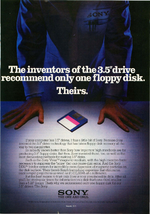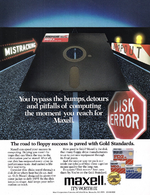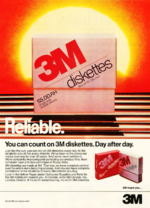This post is not about listing every vendor of floppy disks out there, in 2022, especially since most of us know they can most often be found on EBAY here and Amazon(USA) here. Today, I read this recent INTERVIEW with Tom Persky, who is owner of floppydisk.com. The article inspired me to email a list of 8 questions to the company, for the sake of helping people who may be interested in obtaining new/old-stock floppy disks for the Mac, especially those harder to find 800K disks. This is important because you absolutely should not use 1.44MB HD floppies as 400K or 800K disks. But I also asked about 5.25" disks too, for you Apple II owners. Tom very kindly replied back to me within the hour, answering my questions as follows:
Is this even relevant today with many of us using a FloppyEMU? I think so yes. If it wasn't, why then is there a market for floppy disk drive gears? Fact is that many of us want a fully working machine for the nostalgia and fun. The FloppyEMU should be owned by all of us, but it doesn't mean we can't or don't have a good, working floppy drive too. And again, you should not use the more ubiquitous 1.44MB High Density disks as 400K and 800K disks in the oldest Macs.
Note that you can buy 720K Double-Sided Double-Density disks and format them in your vintage Mac as either 800K or 400K Macintosh disks. You cannot use 800K Mac formatted disks in Most PCs, but if you have the right software on a vintage Mac, you can read 720K PC-formatted disks. And if you happen to have a very rare batch of 400K Single-Sided disks, keep in mind that only one side was certified, so formatting them as 800K may not bode well for your data in the long term.
I hope this information helps those of you searching for Apple branded floppy disks.
To stimulate discussion on this topic, I would encourage you to chime in about what floppy disk brands you have used through the years which have proved to be the MOST RELIABLE over time, especially in high humidity environments which tend to cause mold. Some popular brands (not comprehensive) include: 3M, SONY, Maxell, TDK, Verbatim, BASF, KAO, and Memorex.



When sharing your experience, be sure to mention the disk capacity and the date you purchased them or approximately when they were made. In the article, Tom said, "the best disks are the ones made between 1985 and 2000."
Lastly, if any of you know what company made Apple-branded floppy disks in the 1980's, that would add something useful to this discussion as well. (Sony?)
- Q1: A box of ten 3.5" Macintosh 800K formatted DS/DD MF2-DD list on your website for $19.95. Are these used/recycled with mixed brands, and with existing stickers or sticker residue on them?
We take new old stock DS/DD disks and format them for Mac. So, the newly formatted disks are (on average) a couple of weeks old.
- Q2: Do your Macintosh disks come with clean & unmarked labels, either affixed or in affixable sticker form?
Yes, we include new plain white labels.
- Q3: Do you have new and/or sealed packs of Macintosh 800K DS/DD MF2-DD disks? (If so, brand & price info would be appreciated.)
Almost zero. Maybe 10-15 packs of 10. Various manufacturers. $25 per pack...
- Q4: Do you have any Apple-branded floppy disks, be that 3.5" or 5.25"? And are these new or used? (Pricing and quantity info would be appreciated.)
No new ones. We do have recycled ones, but we commit to degausse/erase them before we resell them...
- Q5: What would be the shipping cost for a box of ten Macintosh 800K DS/DD MF2-DD disks shipped to JAPAN?
We wouldn't ship 10 disks to Japan. The cost would be at least $50 for shipping alone.
Q6: Because all of your floppy disks are "old stock" and none newly manufactured, what is your best guess on their usable lifespan, if stored unused in a cool dry place? Perhaps another 20 years, tops? Also, is occasional reformatting something that would help extend their life or reduce it?
Hard to say. We see 40 year old disks that have no deterioration. Some 5 year old disks are junk. Obviously, the disks are not for archival purposes. Keep the data on a hard drive or the cloud. Then write to disks as needed...
- Q7: Does your storage facility control temperature & humidity or otherwise do something that would help ensure the longevity of the floppy disks you sell?
Just a normal office building in Southern California. So no humidity and no big temperature differential.
- Q8: Do you have any rare or unusual floppies which might be of interest to collectors?
We run a recycling business and I am sure we are destroying collectable stuff all the time. The problem is that it is hard to identify the collectable nuggets in the overall pile!
Is this even relevant today with many of us using a FloppyEMU? I think so yes. If it wasn't, why then is there a market for floppy disk drive gears? Fact is that many of us want a fully working machine for the nostalgia and fun. The FloppyEMU should be owned by all of us, but it doesn't mean we can't or don't have a good, working floppy drive too. And again, you should not use the more ubiquitous 1.44MB High Density disks as 400K and 800K disks in the oldest Macs.
Note that you can buy 720K Double-Sided Double-Density disks and format them in your vintage Mac as either 800K or 400K Macintosh disks. You cannot use 800K Mac formatted disks in Most PCs, but if you have the right software on a vintage Mac, you can read 720K PC-formatted disks. And if you happen to have a very rare batch of 400K Single-Sided disks, keep in mind that only one side was certified, so formatting them as 800K may not bode well for your data in the long term.
I hope this information helps those of you searching for Apple branded floppy disks.
To stimulate discussion on this topic, I would encourage you to chime in about what floppy disk brands you have used through the years which have proved to be the MOST RELIABLE over time, especially in high humidity environments which tend to cause mold. Some popular brands (not comprehensive) include: 3M, SONY, Maxell, TDK, Verbatim, BASF, KAO, and Memorex.



When sharing your experience, be sure to mention the disk capacity and the date you purchased them or approximately when they were made. In the article, Tom said, "the best disks are the ones made between 1985 and 2000."
Lastly, if any of you know what company made Apple-branded floppy disks in the 1980's, that would add something useful to this discussion as well. (Sony?)

